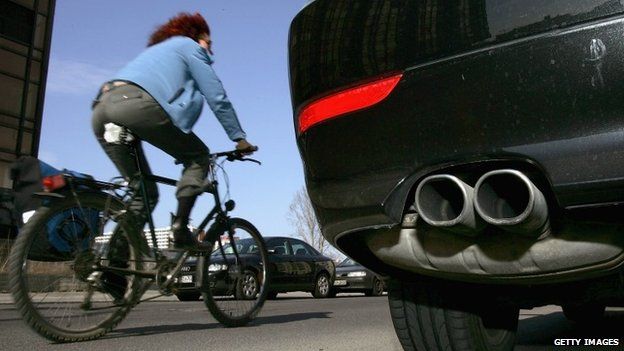Court puts more heat on diesels
- Published

The UK government will come under renewed pressure to cut pollution from diesel vehicles following the latest ruling in a battle over clean air.
Nitrogen dioxide in cities is illegally high and the European Court of Justice ruled judges must force ministers to clean up the air as soon as possible.
The pollutant comes almost entirely from diesel vehicles.
The group that brought the case says the government now has no choice but to restrict diesel emissions.
They say that could force ministers to order a major retrofit of pollution controls on buses and lorries; ban diesel cars from cities; and install new technology to ensure that diesel cars comply with the emissions data from manufacturers.
It’s estimated that 29,000 people die early each year from air pollution in the UK. The government is supposed to have cleaned up nitrogen dioxide pollution in cities by 2015 – but has been proposing to achieve the goal by 2030.
Alan Andrews, ClientEarth lawyer, said: “This ruling is a big victory for the millions of people who want to live healthy lives in the UK’s towns and cities. This will force the government to finally take this issue seriously and come up with an urgent plan to rid our towns and cities of cancer-causing diesel fumes.
“The government has done next to nothing to try to achieve the target of cleaning up the pollution by 2015. The UK Supreme Court will now set a standard that the government must achieve – and that will mean the government driving down diesel emissions.”
Environmentalists are celebrating the European court victory but it causes major political problems for the government. For many years politicians have encouraged drivers to buy diesel cars because they produce fewer climate-changing CO2 emissions.
Friends of the Earth urges ministers to respond by introducing low-emission and congestion charging zones; Scrapping road-building plans, and designing communities with key amenities within easy walking and cycling distance.
A Defra spokesperson said: "Air quality has improved significantly in recent years and average roadside concentrations of NO2 levels have fallen 15% since 2010. We have built on this by committing £2bn since 2011 to increase the uptake of ultra-low emission vehicles, green transport initiatives and supporting local authorities to take action.
"The government is fully committed to ensuring compliance with EU air quality standards and we are revising our plans to reflect recent action so we can be compliant as soon as possible. This is a common challenge across Europe with 17 member states exceeding limits.
"This judgment confirms where limit values are exceeded, plans must be developed which ensure compliance in the shortest possible time - this has always been the government's position."
The chair of the Environmental Audit Committee (EAC) Joan Walley MP said: “We have been warning the government for four years that it must tackle the public health crisis caused by heavy traffic in our towns and cities. Instead of taking action to save lives and protect people, ministers have complacently carried on with business as usual and put off serious efforts to deal with the problem.
"It is not acceptable for ministers who live in leafy suburbs to tell people living next to busy roads in towns and cities that they have to wait until 2030 to breath clean air. Today’s ruling will force the government to prioritise the issue of air quality in all decisions on transport policy and infrastructure.”
ClientEarth’s legal case refers to 16 zones where NO2 limits are being breached. West Midlands, Greater Manchester, West Yorkshire, Teesside, The Potteries, Kingston Upon Hull, Southampton, Glasgow, Eastern England, South East England, East Midlands, North West & Merseyside, Yorkshire & Humberside, West Midlands, North East England and Greater London.
The case may be complicated by a review from the new president of the European Commission Jean-Claude Juncker of pollution laws, which are causing a big problem for many member states.
Follow Roger on Twitter.
- Published10 July 2014
- Published20 February 2014
- Published22 January 2014